
The Priacanthidae, the bigeyes, are a family of 18 species of marine ray-finned fishes. "Catalufa" is an alternate common name for some members of the Priacanthidae. The etymology of the scientific name refers to the family's very rough, spined scales. The common name of "bigeye" refers to the member species' unusually large eyes, suited to their carnivorous and nocturnal lifestyles. Priacanthidae are typically colored bright red, but some have patterns in silver, dusky brown, or black. Most species reach a maximum total length of about 30 cm (12 in), although in a few species lengths of over 50 cm (20 in) are known.

The sandperches are a family, Pinguipedidae, of fishes in the percomorph order Trachiniformes. Sandperches are benthic fish which normally occur over sand or rubble substrates in shallow seas. They are found off the coasts of South America, South Africa and in the Indo-Pacific as far east as Japan. The family contains a few species which are used by humans for food.

Platycephalus is a genus of mostly marine, demersal ray-finned fish belonging to the family Platycephalidae. They are found in the eastern Mediterranean, the Indian Ocean and western Pacific Ocean.
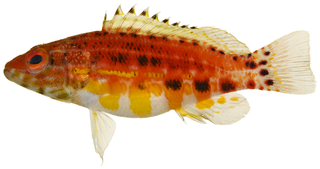
Serranus is a genus of fish in the family Serranidae. It is one of five genera known commonly as the "Atlantic dwarf sea basses". These fish are hermaphrodites, each individual possessing functional male and female reproductive tissues. When a pair spawns, one fish acts as a male and the other acts as a female.
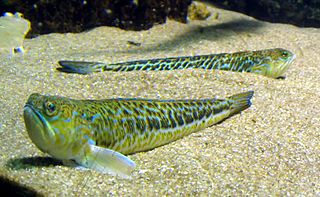
Trachinus is a genus of weevers, order Perciformes that consists of seven extant species. Six of the genus representatives inhabit the waters of Eastern Atlantic Ocean, but only one, Trachinus cornutus, inhabits the South-Eastern Pacific Ocean. Three of the Atlantic species occur near the coasts of Europe. An eighth extinct species, T. minutus, is known from Oligocene-aged strata from the Carpathian Mountains, while a ninth species, also extinct, T. dracunculus, is known from middle-Miocene-aged strata from Piemonte, Italy.
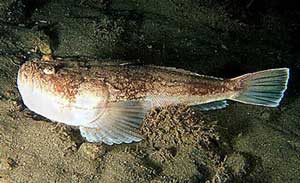
Uranoscopus is a genus of stargazer fish from the family Uranoscopidae. The name Uranoscopus is from the Greek, ouranos, "sky" and skopein, "to watch".

Parapercis is a genus of sandperches belonging to the family Pinguipedidae.

Bembras is a genus of marine ray-finned fish belonging to the family Bembridae, the deepwater flatheads. These fishes are found in the Indian Ocean and the western Pacific Ocean.

Sebastiscus is a genus of marine ray-finned fish belonging to the subfamily Sebastinae part of the family Scorpaenidae. These fishes are native to the western Pacific Ocean. They are collectively called sea ruffes and resemble the rockfishes in the genus Sebastes, but are usually smaller and have a different pattern.

Graus nigra is a species of sea chub endemic to the Pacific coast of South America, ranging from Valdivia in Chile to southern Peru. This species grows to a total length of 64.6 cm (25.4 in) and is popular as a game fish. This species is the only known member of its genus, and is known locally as vieja negra.
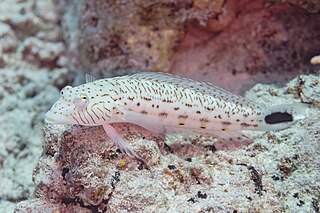
Parapercis hexophtalma, the speckled sandperch, is a species of marine ray-finned fish in the family Pinguipedidae, found in the western Indo-Pacific Ocean. It was first described by the French naturalist Georges Cuvier in 1829. There are several synonyms, some of which represent misspellings of the original name, and others which were given to female fish, at the time thought to be a separate species.
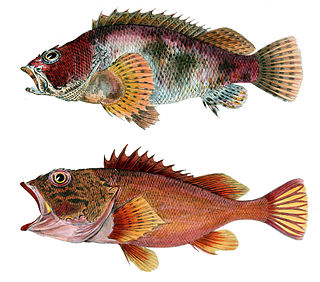
Sebastiscus marmoratus, the sea ruffe, false kelpfish or dusky stingfish, is a species of marine ray-finned fish belonging to the subfamily Sebastinae, the rockfishes, part of the family Scorpaenidae. It is found in the Western Pacific from southern Japan to the Philippines. It has also been sighted twice in Australia.

Haemulinae is a subfamily of the Haemulidae and consists of the genera of that family which are regarded as being of New World origin, although they are now widespread. The subfamily is distinguished from the Plectorhynchinae by having a short dorsal fin which contains 13-16 soft rays, as opposed to the long dorsal fin with 17-26 soft rays of the subfamily Plectorhynchinae.

Chirodactylus variegatus, the Peruvian morwong or bilagai, is a species of marine ray-finned fish traditionally regarded as belonging to the family Cheilodactylidae, the members of which are commonly known as morwongs. It is found in the southeastern Pacific Ocean off the western coast of South America.
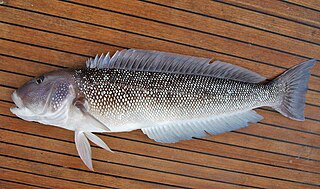
Pseudopercis is a genus of ray-finned fish which are part of the family Pinguipedidae, the sandperches. They are from the coastal waters of South America and are distinguished from other Neotropical sandperches in their more robust heads and bodies.

Pinguipes chilensis, commonly known as the Chilean sandperch, is a species of ray-finned fish in the family Pinguipedidae. It is found in the southeastern Pacific Ocean off the coasts of Peru and Chile.

Pinguipes brasilianus, commonly known as the Brazilian sandperch, is a species of ray-finned fish in the family Pinguipedidae. It is found in the southwestern Atlantic Ocean off the coasts of Brazil and Argentina. It was first described in 1829 by the French naturalist Georges Cuvier.
Microcotyle pseudopercis is a species of monogenean, parasitic on the gills of a marine fish. It belongs to the family Microcotylidae.
Microcotyle moyanoi is a species of monogenean, parasitic on the gills of a marine fish. It belongs to the family Microcotylidae.

Parapercis punctata is a ray-finned fish species in the sandperch family, Pinguipedidae. It is found in the Western Indian Ocean. This species reaches a length of 14.3 cm (5.6 in).


















